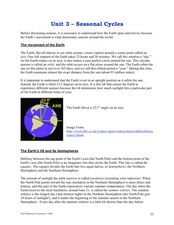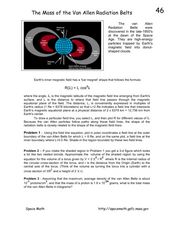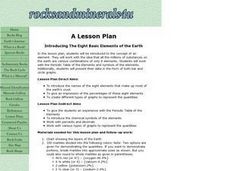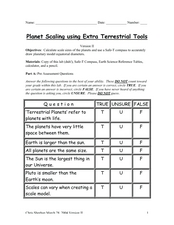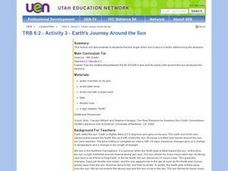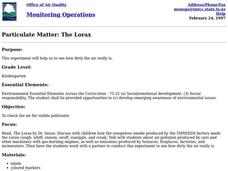Curated OER
Flowers and a Beautiful World: Earth Day (1st)
First graders discuss Earth Day and making the world more beautiful. In this world beautification lesson, 1st graders participate in an interactive read aloud of Barbara Clooney's, Miss Rumphius. They talk about how making the world a...
Curated OER
Pollution
Young ecologists investigate some of the many ways that human activities adversely affect the environment. After identifying the main types of pollution (air, water, soil), 3rd graders fill in a Venn Diagram by pasting cut-out pictures...
Curated OER
Seasonal cycles
Learners understand that the rotation of the Earth is responsible for the seasons. In this seasonal cycles lesson, students learn how the rotation of the Earth affects the seasons. Learners answer questions about the rotation, the...
Curated OER
Our Sun and the Four Seasons
Students discover the relationship between the sun and Earth. In this weather lesson, students examine the effect of the sun on the Earth's seasons. Students complete a weather activity using props to simulate the sun and...
Curated OER
To The Clock of Eras
Third graders investigate the events of geological time using a chart called a "Clock of Eras". In this geological events lesson plan, 3rd graders compare a standard clock to a geological clock. In addition, students consider periods...
Curated OER
Solar System and Planets
Students identify the main components of the solar system. In this earth science lesson plan, students order the planets according to their distances from the Sun. They differentiate planets from dwarf planets.
Curated OER
The Mass of the Van Allen Radiation Belts
For this van Allen Radiation Belts worksheet, students are given the formula for the field line of the Earth's inner magnetic field. Students use this equation to find the polar coordinates of a field line in the van Allen Belts. They...
Curated OER
Hurricanes
Young scholars perform various experiments to explore hurricanes. In this earth science lesson plan, students explain how they form. They identify the structure of a hurricane.
Curated OER
Eight Basic Elements of the Earth
Students identify the concept of an element and work with an idea that all of the millions of substances on the earth are various combinations of only 8 elements. They work with the Periodic Table of the Elements and symbols of the...
Curated OER
What on Earth is in the Earth?
Pupils explore the physical properties of sand, soil, and rocks and sort, classify, compare, and contrast the materials found in the soil. The differences between the living and non-living parts of the soil is discussed.
New York Science Teacher
Planet Scaling using Extra Terrestrial Tools
Your class will use a set scale to convert diameters of planets to the model size, the diagram given to expand on the number of planets drawn as concentric circles, and examine the scale that would be needed to fit the larger...
Science Matters
Thermal Energy Flow in Materials
The sun sends the earth 35,000 times the amount of energy required by all of us on the entire planet, every day. The fourth lesson in the 10-part series looks at how light energy from the sun transfers into thermal energy. Scholars build...
Curated OER
Scenes of the Earth
Learners examine and study how changes in perspective can change the way that they can observe objects. They explore the relationship between a scene's area and its detail. Each student looks at the ground through cardboard tubes from...
Curated OER
The Transit of Mercury
In this transit of Mercury worksheet, learners read about Earth and Mercury lining up so that Mercury passes across the disk of the sun from the Earth's view. Students solve 3 problems and they determine the diameter of the solar disk...
Curated OER
Measuring the Diameter of the Sun
Ninth graders study the sun and its distance from Earth. In this Sun's diameter lesson students examine how measurement data permits accurate measurement of the sun's diameter.
Curated OER
Earth's Journey Around the Sun
Sixth graders examine how the angle of the sun's rays is a factor in determining the seasons. They watch a teacher demonstration of the concepts and write a paragraph demonstrating their understanding.
Curated OER
Moon Crash
In this moon crash worksheet, students research information about the moon. In a given scenario, students decide which emergency supplies to take in order to survive on the moon.
Curated OER
Human Population Growth
In this human population growth worksheet, students create a graph of human population growth and predict future growth using the data given in a chart. Students identify factors that affect population growth.
Curated OER
Particulate Matter: The Lorax
Students explore air pollution. For this ecology lesson, students participate in an experiment in which 5 numbered jar lids are placed outside. Students bring one lid a day in until all jars are inside. Dirt specks are counted, observed,...
Curated OER
This House is Made of Mud: Exploring the Shapes in Our Lives
Students study about our dependence on the earth's resources for materials. They practice their knowledge of geometric shapes by recognizing them in the context of the story.
Colorado State University
Why Do Hurricanes Go Counterclockwise in the Northern Hemisphere?
Test your class' coordination as they model the Coriolis Effect. Forming a large circle, learners move to the right as they try to toss a ball to the person across from them. The movement of the circle represents the rotation of the...
EngageNY
The Motion of the Moon, Sun, and Stars—Motivating Mathematics
What does math have to do with the behavior of the earth and sun? Learn how the movement of celestial bodies has influenced the development of trigonometry. Scholars connects the details in mathematics to their...
Curated OER
Comprehension: Compare and Contrast Topics in Two Texts
A scripted instructional activity can be a big help for new teachers. This fully scripted three-day learning activity provides teachers with the means to demonstrate how to compare and contrast two topics in two texts. Learners will work...
Polar Bears International
Top of the World
Learn about polar bears and the Arctic circle with a lesson about the countries and conditions of the region. After examining how the area differs from Antarctica, kids explore climates, animals, and geographical position...


